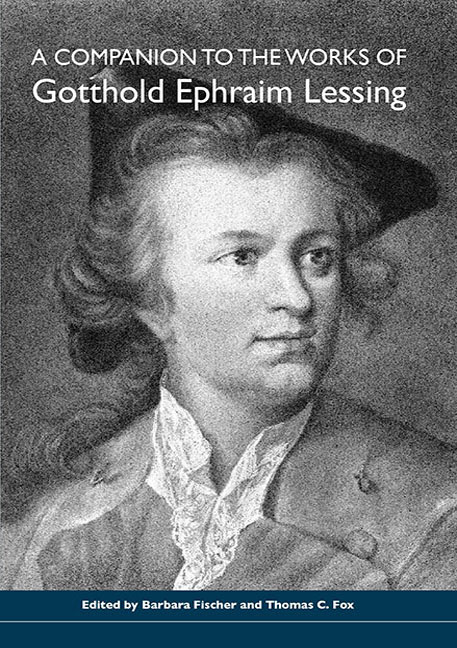Book contents
- Frontmatter
- Contents
- List of Illustrations
- Acknowledgments
- Lessing Editions and Abbreviations
- Selected Works by Lessing
- Introduction
- Lessing's Life, Work, and Times
- Criticism and Aesthetics
- Philosophy and Theology
- Drama and Drama Theory
- Lessing's Drama Theory: Discursive Writings on Drama, Performance, and Theater
- Gender and Identity in Lessing's Dramas
- Reception
- Contact Organizations
- Works Cited
- Notes on the Contributors
- Index
Lessing's Drama Theory: Discursive Writings on Drama, Performance, and Theater
from Drama and Drama Theory
Published online by Cambridge University Press: 28 April 2017
- Frontmatter
- Contents
- List of Illustrations
- Acknowledgments
- Lessing Editions and Abbreviations
- Selected Works by Lessing
- Introduction
- Lessing's Life, Work, and Times
- Criticism and Aesthetics
- Philosophy and Theology
- Drama and Drama Theory
- Lessing's Drama Theory: Discursive Writings on Drama, Performance, and Theater
- Gender and Identity in Lessing's Dramas
- Reception
- Contact Organizations
- Works Cited
- Notes on the Contributors
- Index
Summary
Introduction
What is enlightenment? It is an act of conscious resistance against a tradition that is perceived as antiquated or irrational. It is a process in which one first evaluates the current state of knowledge in specific areas of society that seem outdated, before one develops an empirical, philosophical, or scientifically informed and new approach. This critical work can penetrate and apply to every aspect of knowledge in society: philosophy, politics, the sciences, health, agriculture, farming, literature or, as in our case, theater. Common in all these efforts is the desire to change society in the social, political, or cultural domain. This process and project of Enlightenment pervaded mainly England, France, and Germany during the eighteenth century. The bourgeoisie, especially young intellectuals, were the main social group that embraced and advanced the project of Enlightenment. Lessing — one can easily argue — embodies the paradigm of German Enlightenment in the second half of the eighteenth century.
This essay deals with Lessing's discursive writings on dramatic literature (that is, referring to a written text by a playwright), performance (acting, actors, and production on stage), and theater (the institution). There is no such thing as Lessing's “drama theory,” assuming that theory implies one systematic, coherent, and all-encompassing text. Johann Christoph Gottsched (1700–1766) in his Versuch einer Critischen Dichtkunst vor die Deutschen (An Essay on Critical Poetics for the Germans, 1730) was the last person to develop such a comprehensive theory. Instead, Lessing wrote diverse texts in several genres, in which he develops a new approach toward drama, performance, and theater. In this sense, Lessing's theoretical texts on drama — as opposed to his plays — were a work in progress. One can extract from these writings his theoretical positions on the “bürgerliche Trauerspiel” (bourgeois tragedy), on the “rührende Lustspiel” (sentimental comedy), on acting, and on the institutionalization of theater.
The process of Lessing's theoretical engagement with drama and theater is also evident when looking to the biographical context. As a student in Leipzig — at the age of seventeen — he visited theater performances and began writing on all aspects of theater. He continued this until the age of thirty-eight when the Deutsche Nationaltheater in Hamburg closed.
- Type
- Chapter
- Information
- A Companion to the Works of Gotthold Ephraim Lessing , pp. 211 - 230Publisher: Boydell & BrewerPrint publication year: 2005



